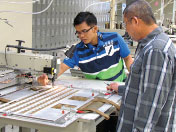Helping Diverse Job Seekers 'Fit' Into a Tight Job Market
- Ann Marie Ryan
- Professor, Department of Psychology
- Director, Identity Management Lab
- College of Social Science
With a tight job market and many people vying for the same jobs, how do you approach a job interview if you identify yourself with a group
that is potentially stigmatized or marginalized? And if you are an employer doing the hiring, how do you make your company welcoming to diverse or marginalized populations? Ann Marie Ryan researches how members of various social groups manage their identity in a work context, as well as the conditions under which certain identity management strategies are adopted.
Promoting a Diverse Work Climate

Ashley Groggins, former graduate student with Ryan's Identity Management Lab, is now a human resources assistant at Peckham Industries.
One local organization that prioritizes a positive diversity climate is Peckham Industries, a Lansing-based nonprofit company that focuses on providing vocational employment for people with disabilities. It was an apt site for Ryan to research workplace diversity. "This project was unique because Peckham is a very different kind of corporation. It's an organization primarily focused on vocational support for people with disabilities. But we wanted to study it as an example of—I almost want to call it extreme diversity, if you will— because it's an organization that is unique in terms of the kinds of people who work there," said Ryan.
Peckham is certainly unique in that most of the employees have some form of disability. But it's also unique because of the incredible ethnic diversity, with 34 different languages being spoken by their employees. Yet, things that might be traditionally seen as barriers—language differences, cultural preferences, and ability challenges—seem instead to help Peckham thrive.
Ryan was interested in learning about how Peckham is able to function, and what other organizations can learn from them. So her team conducted focus groups with staff members at the company to discover keys to their success. One thing they found was the importance of flexibility in handling each diversity-related situation. Ashley Groggins, a former graduate student member of Ryan's team who is now a human resources assistant at Peckham, coordinated the focus groups and worked with Ryan on putting together the research report. She explained how it works: "I believe the key to how Peckham's diversity thrives is accommodation—knowing that every situation needs to be handled differently because everyone is different and comes from different circumstances and backgrounds," she said.
Managing a Marginalized Identity

Diversity thrives at Peckham because each situation is handled individually.
More recently, Ryan has been investigating how individuals who perceive that they are part of a stigmatized group manage identity disclosure, especially as they look for a job. Related to this work, Ryan directs the Identity Management Lab, where she supervises students who are currently investigating the strategies of female faculty members, individuals with mental disabilities, atheists in the workplace, and Muslim and African American job seekers.
The ACCESS Center in Dearborn, Michigan, the largest Arab American human services nonprofit organization in the United States, assists a variety of cultural groups in Southeast Michigan. One of Ryan's students, Abdifatah Ali, was particularly interested in Arab Americans as job seekers. Under Ryan's supervision, he conducted surveys at ACCESS with two different sample groups of unemployed job seekers (primarily Arab American and African American), in which the researchers asked about issues of perceived discrimination. According to Ali, "We found that when these job seekers felt as though they were being treated differently while interacting with a prospective employer, that had negative consequences on the extent to which they subsequently performed job searching behaviors, such as filling out another application and going to another interview, and the amount of effort they exerted toward those same behaviors." In other words, they became discouraged about the job hunt.
"With our study, we noticed that people who had higher confidence were reporting higher ratings of job search behavior as well as job search effort."
Abdifatah Ali
Ali is currently writing a technical report that includes recommendations for ACCESS. "One important thing ACCESS can do to help their clients is to increase their job search self-efficacy or confidence," he suggested. "With our study, we noticed that people who had higher confidence were reporting higher ratings of job search behavior as well as job search effort."
Focusing on the Individual
While Ryan's research has always focused on improving hiring practices, especially as it relates to diversity, and designing better tests and interviews, her more recent focus on identity management came from a desire to look beyond the testing, to the individual and the choices he or she makes. "It starts to put the focus on the person who is experiencing the discrimination or the harassment," she explained. "They do have choices. But we don't really give them much advice. Or we give advice but we don't actually have a lot of empirical evidence regarding how it will affect outcomes for them."
Ryan hopes her work will help to improve outcomes for these individuals. "I think we could be helpful, particularly in these times, for the job seeker," she says. "Companies right now have a lot of people to choose from—not in all jobs, but for certain jobs—and job seekers have a rough time right now."
- Written by Amy L. Byle, University Outreach and Engagement